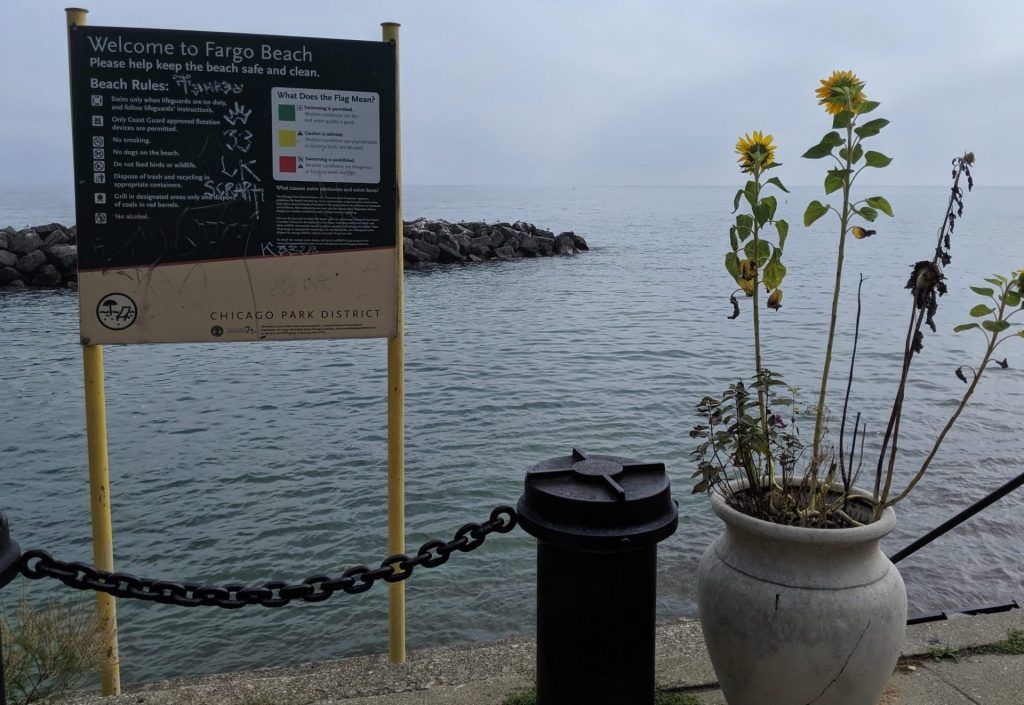Researchers think they know what’s causing record water levels on and flooding around the Great Lakes: climate change
By Matt Field | September 20, 2019
 Fargo Beach on Chicago's North Side is no longer. The city's park district closed the beach after near record Lake Michigan water levels submerged most of the sand. Credit: Matt Field.
Fargo Beach on Chicago's North Side is no longer. The city's park district closed the beach after near record Lake Michigan water levels submerged most of the sand. Credit: Matt Field.
This story is part of Covering Climate Now, a global collaboration of more than 300 news outlets to strengthen coverage of the climate story.
Fires rage across the American West. Hurricanes batter the East Coast. Rising seas inundate coastal cities. In many parts of the United States, the signs of climate change are hard to miss. But the Great Lakes region of the Midwest has been considered something of a climate haven, a place to seek refuge from the ravages or stresses of climate change. That reputation, however, could be figuratively and literally eroding.
Researchers say climate change is indeed impacting the Great Lakes. It’s eroding shorelines, altering ecosystems, and causing flooding and economic damage. But scientists hoping to communicate the effects of climate change on the lakes have to first confront a seemingly incongruous set of facts: While shoreline communities now gird themselves for flooding, lake levels were at historic lows as recently as 2013. “We’re at the beginning of this period of rapid change,” University of Michigan climate scientists Prof. Richard B. Rood says. “We’re not going to stabilize on something.”
Rood and fellow University of Michigan Prof. Andrew Gronewold are planning research to attribute the variation in lake levels to climate change. At this point, they can say climate change is impacting lake levels because it’s impacting the broader climate. “If you want to understand why water levels are changing, you need to look at precipitation, evaporation, and runoff,” Gronewold says. “And if you want to understand why precipitation, evaporation, and runoff are changing, you’ve got to have a good understanding of climate change on continental and global scales.”
Because of climate change, when the global weather patterns that impact regional climate cause more precipitation, that precipitation is more severe. When those same patterns translate to drier weather, that weather causes greater evaporation from the Great Lakes. “The community of climate skeptics have picked up on what Drew and I have been saying and mocking us for it,” Rood says, “’Well, first low lake levels were climate change now high lake levels. They say anything they want!’”
The recent trend of rising water levels is having disastrous effects. In May, New York Gov. Andrew Cuomo stood along the shore of Lake Ontario and, after lamenting that he’d rather be fishing, said that he was instead declaring a state of emergency. In 2017, high water had flooded shoreline communities and damaged 4,000 properties. “Prepare for a redux of the same situation,” the governor told constituents. The water level was at 248.68 feet above sea level, just a few decimal points short of the 249 feet that caused so much damage two years earlier. Lake Ontario water levels are still 19 inches above their long-term monthly average for September, according to the most-recent weekly report on water levels from the US Army Corps of Engineers. All the lakes are up between 12 and 30 inches above the long-term average.

In Chicago, crews began erecting flood barriers along Lake Michigan in September. Near record water levels have almost completely submerged two of the sandy beaches that line the city’s lakefront. Condo buildings and other properties that abut the water are shelling out for reinforcements of their own. For cities and towns on the Great Lakes, closing beaches could have big economic consequences. According to a 2013 report from the Great Lakes Commission, an interstate agency, tourism along the 63 miles of Lake Michigan shore in Illinois draws 20 million people annually and recreational activities contribute $3.2 billion to the economy. And climate change isn’t just submerging beaches and affecting property owners; it’s also impacting aquatic ecosystems.
Fish populations are changing in numbers and moving geographically. Some fish like smallmouth bass, for instance, have migrated to warming waters. Some fish, like the lake whitefish, may see growth rates decline. That’s according to a recent report on climate change and the Great Lakes by the nonprofit Environmental Law & Policy Center. Invasive species like sea lampreys, a North Atlantic fish that sucks the bodily fluids out of its prey, are growing larger and more deadly to the recreationally and commercially important fish they feed on. As rain and snow become more severe, sewage and farm runoff could increasingly be flowing into the lakes, causing bacteria levels to spike and feeding dangerous algae blooms.
The Great Lakes collectively represent about 1/5 of the world’s fresh surface water supply. About 10 percent of the US population, 30 million people, lives around them. While climate change will be affecting them, in just what direction may well vary. “It’s a lot harder on the Great Lakes to say, ‘hey, climate change is going to lead to increased variability.’” Gronewold says. “What does that mean from a planning perspective? Does that mean that we should be planning for high water levels, low water levels, or both?”
The answer, of course, is both.

Together, we make the world safer.
The Bulletin elevates expert voices above the noise. But as an independent nonprofit organization, our operations depend on the support of readers like you. Help us continue to deliver quality journalism that holds leaders accountable. Your support of our work at any level is important. In return, we promise our coverage will be understandable, influential, vigilant, solution-oriented, and fair-minded. Together we can make a difference.
Keywords: Andrew Gronewold, Covering Climate Now, Great Lakes, Lake Michigan, Lake Shore Drive, Richard B. Rood, flooding
Topics: Climate Change














